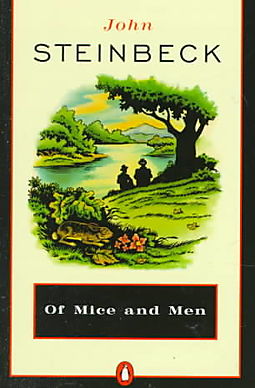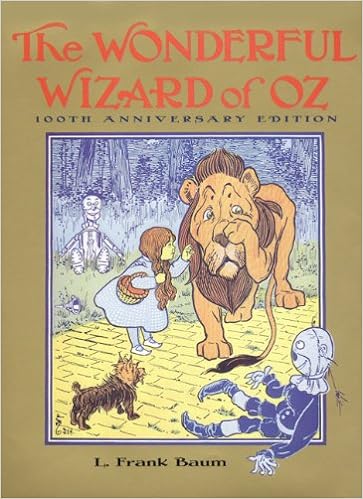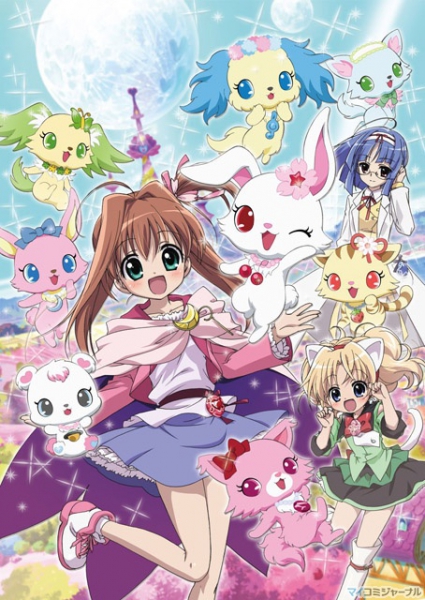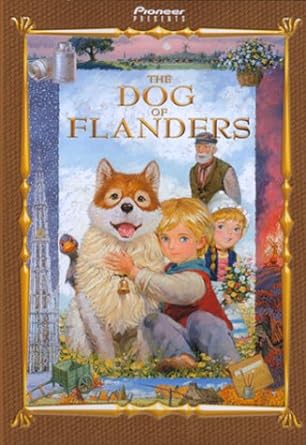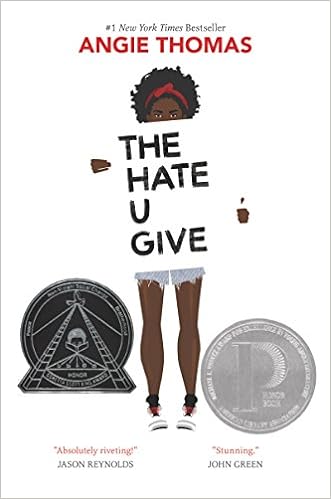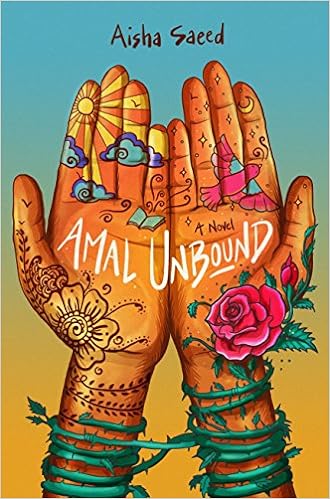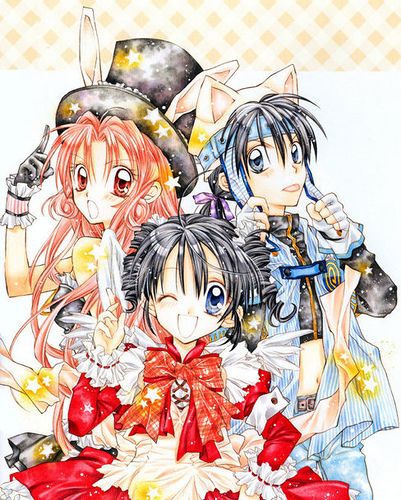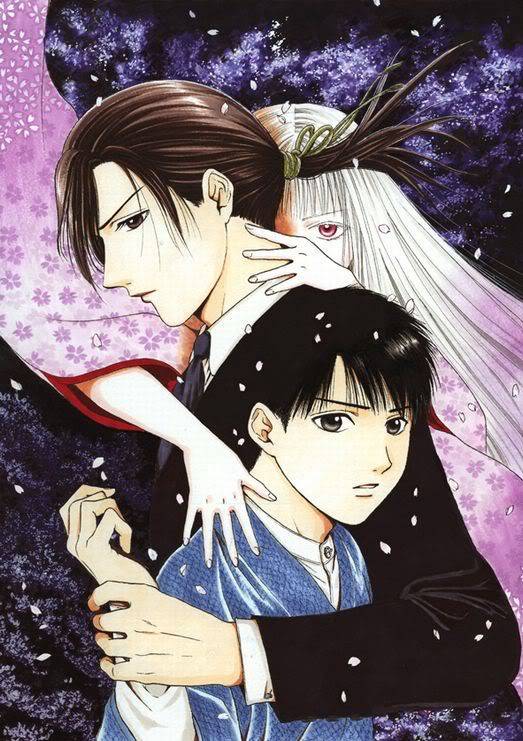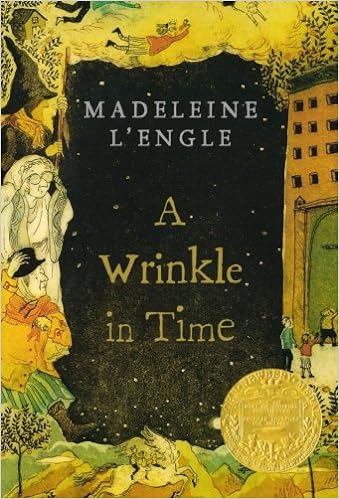- Joined
- Aug 10, 2015
- Messages
- 3,771
- Reaction score
- 2,598
So...hey there! You all know me as Julia or Juliko here, and you all know that I love anime, manga, games, books, all that good stuff. I also like dabbling into reviewing things and critiquing them. If you've been watching/reading/playing stuff for as long as I have, you become a bit more aware of what works in some things and what doesn't. Some media can be good, decent, fair, mediocre, average, bad, or outright terrible. I know some of you read Roger Ebert's critique of various movies or have watched reviewers such as The Nostalgia Critic or Todd In The Shadows. I've actually been reviewing stuff as far back as 2010, and I often post reviews on my Livejournal account here and on my account on My Anime List. Since the forum was revamped, I began thinking...why not post my reviews here so everyone can see them? And thus, I decided to start a reviewing blog here, which I call Julia's Reviews On All Things Media! I'll post my opinions on various things and encourage people to discuss them here if they wish. I hope you all enjoy reading my stupid, random ramblings!
Now, there are some rules you'll need to follow:
100/100: The perfect anime.
97-99/100: The absolute best of the best, my all-time favorite(s).
95-96/100: Truly amazing and outstanding series, the best of their genres. These series made a huge impact on me.
92-94/100: Simply fantastic anime. These series have many areas in which they stand out like no other.
90-91/100: Anime that achieved exactly what they set out to do. Incredibly solid productions with so many things to like about them.
87-89/100: Awesome series. These stand out in many different areas and provide a very solid experience.
85-86/100: Excellent series. They may have a few flaws here and there, but overall they remain wonderful series with quite a few memorable moments.
84/100: These series are greatly enjoyable with a lot of reasons to make them worth watching, although there are a few things holding them back from real excellence.
82-83/100: Series with this score are destined for greatness, although they may have a few flaws here and there.
81/100: These are very good series, who have a few highlights here and there that make them enjoyable and worth watching.
80/100: Very good series, worth the watch. They may lack highlights, but remain really enjoyable nonetheless.
77-79/100: Enjoyable series. While not the best of the best, they’ve got quite a few good points and are nice to watch, save for a few flaws.
75-76/100: Series that are either nothing special, or shows that could have been awesome, yet were plagued by too many flaws.
72-74/100: These series did quite a few things wrong here. They’ve got some nice parts, but overall they’re not worth it.
70-71/100: Very flawed series that are only enjoyable if you’re really bored.
65-69/100: The epitome of mediocrity. These have one or two good points, but mostly they’re just bad and boring.
60-64/100: The bad stuff. Some redeeming qualities, mixed with a whole lot of garbage.
50-59/100: Garbage, stay away.
40-49/100: Utter crap.
Anything below 39: Downright terrible.
Now without further ado, let's start this off with a review I just recently finished for Studio Ghibli's debut movie, Laputa: Castle In The Sky, which I give an 83 out of 100!
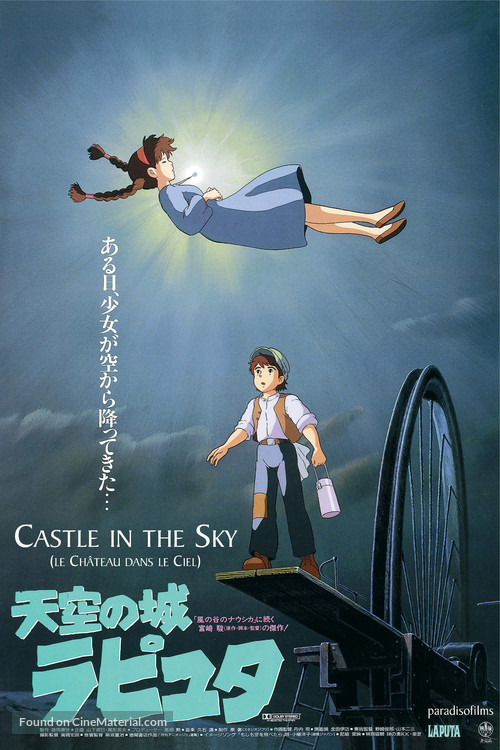
In the early 1980s, a man named Hayao Miyazaki was just hot off the success of one of his first animated features, Nausicaa and the Valley of the Wind. With all the money that came in thanks to Nausicaa's success, he decided to make his own company. With lots of hard work and help from friends, namely Isao Takahata and Toshio Suzuki, Studio Ghibli was born. The first movie Ghibli ever made was this one, Laputa: Castle In The Sky, or just Castle In The Sky, since Laputa is apparently an offensive Spanish slur, not that the producers knew that at the time. From all the information I could find, Castle In The Sky was a hit, raking in lots of money and helping to establish Ghibli as a movie-making force to be reckoned with, to the point where it inspired many other works that would come later, with many considering it to be one of the first modern steampunk classics. Hironobu Sakaguchi has gone on to confirm that Castle In The Sky had a big influence on early Final Fantasy titles, particularly the airship designs. But how well does the movie hold up now? Let's take a look!
The story begins with a girl named Sheeta escaping an airship, having been kidnapped by a group of military agents who want to use her magical crystal necklace. She is saved by a young boy named Pazu, who works in a mine. The two become fast friends, but both the military agents and a group of pirates led by a woman named Dola are still after Sheeta, and Pazu is determined to help her in any way he can. Pazu is also trying to find the mysterious floating castle known as Laputa, which some say doesn't really exist. But as it turns out, Sheeta has more of a connection to Laputa than anyone realized, and one man in particular, Muska, is dead set on finding Laputa and using it for his own evil purposes. Pazu and Sheeta have to work together to not only save themselves, but Laputa and the world below.
If you're thinking the storyline is rather cliche, what with a boy helping a damsel in distress princess who has a magical McGuffin that everybody wants and fighting an evil man who wants to use said McGuffin for whatever, then you're right. By today's standards, the story isn't really much to write home about, as a lot of these things have been done before, with some doing it better than this. But there's really no such thing as originality anymore, so it really depends on the execution. In that aspect, I think Castle In The Sky, while it does use a lot of tropes and cliches common in most stories we know off, manages to handle them very well with what it had. But it can't be denied that it does stumble and make a few missteps, so the movie's not without its flaws.
But I don't want to damper the review with the negatives just yet, so I'll focus on the good aspects first. I don't think I need to talk too much about Ghibli's animation because, well, everybody knows how great Ghibli is with their animation, so talking about how great it is would be redundant. I can say that the amount of creativity that Miyazaki and the animators put into the fantasy setting is really original. From the mining town to the Laputa castle itself and its mixture of technology and nature, the setting really draws you in. The lush colors, the fantastical creatures, the stone caves with lights that look like tiny galaxies and starscapes, and the hyper detailed airships really draw you into the movie and its world. I can only imagine that this movie must have been revolutionary for its time period, and in that aspect, Laputa definitely succeeds on this front.
The soundtrack is just as good, which is no surprise, since Joe Hisaishi worked on it. Every piece of music works in their assigned scenes, knowing when to hold back and when to let loose, and setting the mood and atmosphere for each part. The ending song by Azumi Inoue is also very nice and well sung. Oddly enough, when Disney got the license to the movie, they commissioned Joe Hisaishi to rerecord the soundtrack for the movie with an orchestra and adding more music exclusively for their release back then. I did watch the dub with the rescore, since that was what I had found at first, and I did watch the Japanese version later, and I like both soundtracks for what they are. Considering I heard that the rescore was lambasted and hated when it first came out, I couldn't comprehend what the problem was. I mean, the music still works and fits the mood of the movie, even with a bit of lull destruction here and there, but it doesn't overpower the quiet scenes or ruin the atmosphere. Hey, I think we can all agree that the rescore is far and away better than...I don't know, every single Saban soundtrack that's made for every anime dub they (Saban) work on ever (Digimon and the recent dubs of Smile and Doki Doki Precure/Glitter Force, anyone?). Yeah, those soundtracks can be guilty of killing or ruining quieter moments and trying to add unnecessary, obnoxious, unsubtle music to EVERY SCENE due to the so-called idea that kids will hate any kind of silent or atmospheric moments. even a millisecond of it. At least Hisaishi's rescore doesn't do that.
The characters, I'm a bit conflicted on. They're not bad or anything, far from it. The side characters--namely Dola's pirate gang--are all colorful, fun, and full of personality, even if we don't know them very well...except for Muska, who is definitely a stereotypical evil bad guy who wants Sheeta and her crystal necklace so he can take control of Laputa and use it to take over the world. He doesn't have a whole lot of substance, and we don't really learn why he's like that in the first place, so he's not a very interesting villain. Though, to be fair, Mark Hamil's voice for him definitely gives him a lot of charisma and makes him seem both cunningly charming and menacing, so I'll give him that. I like Pazu well enough, he's okay, but in the end, he doesn't really carry the weight of the movie, and he spends a lot of his time doing impossible heroic feats that no kid his age should be able to do. He's not a bad, poorly written character, but he could have done more. That said, I've seen people give Sheeta a lot of flak for supposedly being a useless damsel in distress, and I think those complaints are unfounded. She's not a super strong badass action girl, but she doesn't need to be. She's smart, she's resourceful, and while it's clear she's not a fighter, she at least makes an effort to get out of her bad situations when she can and tries not to let anyone walk all over her, as shown in the beginning when she whacks Muska with a wine bottle and escapes the airship, bites one soldier trying to catch her, and attempts other escapes from her captors. I'd compare her to Maya Fey from the Ace Attorney series. She's not physically strong, but they say true strength lies within, and I think Sheeta deserves some recognition for that.
So the movie is lavishly animated and scored and has a unique setting that feels intriguing, but falls into a lot of cliches. I guess you can say it's both timeless and dated at the same time, if such a thing is possible. The idea of a boy saving a mysterious girl who turns out to be the queen of an extinct race has been done to death lots of times over the past few decades, and while it is nicely done here, it still feels a little vanilla. Plus, there are some details the movie just forgets about in its quest to make heart-pumping action. Like, one character destroys a roof, and nobody bothers to fix it, and nobody complains about the damage that's been done to their mines and how they have to deal with the construction afterward. Heck, a wooden bridge for mine carts is destroyed, and then it disappears, completely forgotten. So in the movie's attempts to have a lot of action, it winds up not following up on some of the more minor details that would have added some realism to the movie. But some other details they add are really good, such as an entire mining town going way out of their way to stop a bunch of pirates from kidnapping a little girl they know nothing about.
In the end, I wouldn't call Laputa: Castle In The Sky Ghibli's best movie. Kaguya, Marnie, and Whisper of the Heart are my personal favorites, and I feel that they're better. But that definitely doesn't mean Laputa doesn't deserve the popularity that it's gotten, especially considering the impact it's had on the anime and game industry in general. If we didn't have Laputa, stuff like Steamboy and the original Final Fantasy games probably wouldn't exist. It's still a fairly nice, exciting, imaginative movie that doesn't insult the audience's intelligence and has a lot of heart. Flaws and all, I still consider this a movie worth watching, especially if you want to introduce someone new to anime as a whole. I'd give it a solid 83/100.
Now, there are some rules you'll need to follow:
- These are just my personal opinions on the things I review. If you disagree with them or have something to discuss about my reviews, that's great! We can be free to disagree, and I encourage others to share their opinions and views as well. But please be mature and respectful about it. Don't bully, antagonize, or shame me or others on their personal opinions on things. I've had to deal with that before in other fandoms, and I'd rather that be avoided here. If you like or hate a show/book/game that I happened to hate or like, that's fine, too. Everyone's tastes are different, and that's good!
- Some of these reviews will contain spoilers, though they will be hidden and marked accordingly. Some works gave me a lot of feelings and opinions on certain things, and I feel that some of my feelings won't be made clear enough or given enough context if I don't actually explain certain things in detail, lest they make my comments more confusing. If you don't like spoilers, that's fine, and I make sure to hide them. But if you want to discuss the spoilers, please hide them under spoiler tags as well for others who aren't familiar with the material.
- Many of the subjects I'll look at are solely stuff that I've seen, read, or played, so if you're expecting me to review Cowboy Bebop or Haruhi Suzumiya, good luck, because I haven't seen them, nor do I want to. I also don't review live-action movies, so those won't be covered.
- Okay, new rule as of March 28th, 2022: No quoting an ENTIRE post on here, pictures and all. You can reference the post or quote parts of a review if you'd like, but not the whole thing, and this includes the pictures I use, as it throws me off and takes up too much posting space.
- No requests.
100/100: The perfect anime.
97-99/100: The absolute best of the best, my all-time favorite(s).
95-96/100: Truly amazing and outstanding series, the best of their genres. These series made a huge impact on me.
92-94/100: Simply fantastic anime. These series have many areas in which they stand out like no other.
90-91/100: Anime that achieved exactly what they set out to do. Incredibly solid productions with so many things to like about them.
87-89/100: Awesome series. These stand out in many different areas and provide a very solid experience.
85-86/100: Excellent series. They may have a few flaws here and there, but overall they remain wonderful series with quite a few memorable moments.
84/100: These series are greatly enjoyable with a lot of reasons to make them worth watching, although there are a few things holding them back from real excellence.
82-83/100: Series with this score are destined for greatness, although they may have a few flaws here and there.
81/100: These are very good series, who have a few highlights here and there that make them enjoyable and worth watching.
80/100: Very good series, worth the watch. They may lack highlights, but remain really enjoyable nonetheless.
77-79/100: Enjoyable series. While not the best of the best, they’ve got quite a few good points and are nice to watch, save for a few flaws.
75-76/100: Series that are either nothing special, or shows that could have been awesome, yet were plagued by too many flaws.
72-74/100: These series did quite a few things wrong here. They’ve got some nice parts, but overall they’re not worth it.
70-71/100: Very flawed series that are only enjoyable if you’re really bored.
65-69/100: The epitome of mediocrity. These have one or two good points, but mostly they’re just bad and boring.
60-64/100: The bad stuff. Some redeeming qualities, mixed with a whole lot of garbage.
50-59/100: Garbage, stay away.
40-49/100: Utter crap.
Anything below 39: Downright terrible.
Now without further ado, let's start this off with a review I just recently finished for Studio Ghibli's debut movie, Laputa: Castle In The Sky, which I give an 83 out of 100!

In the early 1980s, a man named Hayao Miyazaki was just hot off the success of one of his first animated features, Nausicaa and the Valley of the Wind. With all the money that came in thanks to Nausicaa's success, he decided to make his own company. With lots of hard work and help from friends, namely Isao Takahata and Toshio Suzuki, Studio Ghibli was born. The first movie Ghibli ever made was this one, Laputa: Castle In The Sky, or just Castle In The Sky, since Laputa is apparently an offensive Spanish slur, not that the producers knew that at the time. From all the information I could find, Castle In The Sky was a hit, raking in lots of money and helping to establish Ghibli as a movie-making force to be reckoned with, to the point where it inspired many other works that would come later, with many considering it to be one of the first modern steampunk classics. Hironobu Sakaguchi has gone on to confirm that Castle In The Sky had a big influence on early Final Fantasy titles, particularly the airship designs. But how well does the movie hold up now? Let's take a look!
The story begins with a girl named Sheeta escaping an airship, having been kidnapped by a group of military agents who want to use her magical crystal necklace. She is saved by a young boy named Pazu, who works in a mine. The two become fast friends, but both the military agents and a group of pirates led by a woman named Dola are still after Sheeta, and Pazu is determined to help her in any way he can. Pazu is also trying to find the mysterious floating castle known as Laputa, which some say doesn't really exist. But as it turns out, Sheeta has more of a connection to Laputa than anyone realized, and one man in particular, Muska, is dead set on finding Laputa and using it for his own evil purposes. Pazu and Sheeta have to work together to not only save themselves, but Laputa and the world below.
If you're thinking the storyline is rather cliche, what with a boy helping a damsel in distress princess who has a magical McGuffin that everybody wants and fighting an evil man who wants to use said McGuffin for whatever, then you're right. By today's standards, the story isn't really much to write home about, as a lot of these things have been done before, with some doing it better than this. But there's really no such thing as originality anymore, so it really depends on the execution. In that aspect, I think Castle In The Sky, while it does use a lot of tropes and cliches common in most stories we know off, manages to handle them very well with what it had. But it can't be denied that it does stumble and make a few missteps, so the movie's not without its flaws.
But I don't want to damper the review with the negatives just yet, so I'll focus on the good aspects first. I don't think I need to talk too much about Ghibli's animation because, well, everybody knows how great Ghibli is with their animation, so talking about how great it is would be redundant. I can say that the amount of creativity that Miyazaki and the animators put into the fantasy setting is really original. From the mining town to the Laputa castle itself and its mixture of technology and nature, the setting really draws you in. The lush colors, the fantastical creatures, the stone caves with lights that look like tiny galaxies and starscapes, and the hyper detailed airships really draw you into the movie and its world. I can only imagine that this movie must have been revolutionary for its time period, and in that aspect, Laputa definitely succeeds on this front.
The soundtrack is just as good, which is no surprise, since Joe Hisaishi worked on it. Every piece of music works in their assigned scenes, knowing when to hold back and when to let loose, and setting the mood and atmosphere for each part. The ending song by Azumi Inoue is also very nice and well sung. Oddly enough, when Disney got the license to the movie, they commissioned Joe Hisaishi to rerecord the soundtrack for the movie with an orchestra and adding more music exclusively for their release back then. I did watch the dub with the rescore, since that was what I had found at first, and I did watch the Japanese version later, and I like both soundtracks for what they are. Considering I heard that the rescore was lambasted and hated when it first came out, I couldn't comprehend what the problem was. I mean, the music still works and fits the mood of the movie, even with a bit of lull destruction here and there, but it doesn't overpower the quiet scenes or ruin the atmosphere. Hey, I think we can all agree that the rescore is far and away better than...I don't know, every single Saban soundtrack that's made for every anime dub they (Saban) work on ever (Digimon and the recent dubs of Smile and Doki Doki Precure/Glitter Force, anyone?). Yeah, those soundtracks can be guilty of killing or ruining quieter moments and trying to add unnecessary, obnoxious, unsubtle music to EVERY SCENE due to the so-called idea that kids will hate any kind of silent or atmospheric moments. even a millisecond of it. At least Hisaishi's rescore doesn't do that.
The characters, I'm a bit conflicted on. They're not bad or anything, far from it. The side characters--namely Dola's pirate gang--are all colorful, fun, and full of personality, even if we don't know them very well...except for Muska, who is definitely a stereotypical evil bad guy who wants Sheeta and her crystal necklace so he can take control of Laputa and use it to take over the world. He doesn't have a whole lot of substance, and we don't really learn why he's like that in the first place, so he's not a very interesting villain. Though, to be fair, Mark Hamil's voice for him definitely gives him a lot of charisma and makes him seem both cunningly charming and menacing, so I'll give him that. I like Pazu well enough, he's okay, but in the end, he doesn't really carry the weight of the movie, and he spends a lot of his time doing impossible heroic feats that no kid his age should be able to do. He's not a bad, poorly written character, but he could have done more. That said, I've seen people give Sheeta a lot of flak for supposedly being a useless damsel in distress, and I think those complaints are unfounded. She's not a super strong badass action girl, but she doesn't need to be. She's smart, she's resourceful, and while it's clear she's not a fighter, she at least makes an effort to get out of her bad situations when she can and tries not to let anyone walk all over her, as shown in the beginning when she whacks Muska with a wine bottle and escapes the airship, bites one soldier trying to catch her, and attempts other escapes from her captors. I'd compare her to Maya Fey from the Ace Attorney series. She's not physically strong, but they say true strength lies within, and I think Sheeta deserves some recognition for that.
So the movie is lavishly animated and scored and has a unique setting that feels intriguing, but falls into a lot of cliches. I guess you can say it's both timeless and dated at the same time, if such a thing is possible. The idea of a boy saving a mysterious girl who turns out to be the queen of an extinct race has been done to death lots of times over the past few decades, and while it is nicely done here, it still feels a little vanilla. Plus, there are some details the movie just forgets about in its quest to make heart-pumping action. Like, one character destroys a roof, and nobody bothers to fix it, and nobody complains about the damage that's been done to their mines and how they have to deal with the construction afterward. Heck, a wooden bridge for mine carts is destroyed, and then it disappears, completely forgotten. So in the movie's attempts to have a lot of action, it winds up not following up on some of the more minor details that would have added some realism to the movie. But some other details they add are really good, such as an entire mining town going way out of their way to stop a bunch of pirates from kidnapping a little girl they know nothing about.
In the end, I wouldn't call Laputa: Castle In The Sky Ghibli's best movie. Kaguya, Marnie, and Whisper of the Heart are my personal favorites, and I feel that they're better. But that definitely doesn't mean Laputa doesn't deserve the popularity that it's gotten, especially considering the impact it's had on the anime and game industry in general. If we didn't have Laputa, stuff like Steamboy and the original Final Fantasy games probably wouldn't exist. It's still a fairly nice, exciting, imaginative movie that doesn't insult the audience's intelligence and has a lot of heart. Flaws and all, I still consider this a movie worth watching, especially if you want to introduce someone new to anime as a whole. I'd give it a solid 83/100.
Last edited:

